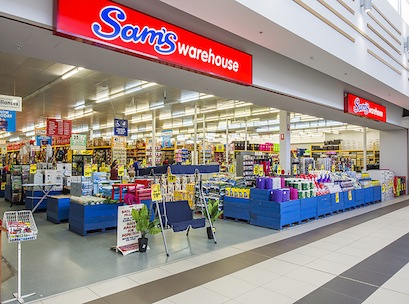Jan Cameron has given up trying to turnaround the discount store group she acquired from receivers in 2009 and re-purchased last year. Cameron is looking for a third party investment in her DSG business or a trade sale after deciding to exit another 50 stores from the Sam’s Warehouse and Crazy Clark’s chains. Inside Retail PREMIUM has been told that the business may be forced to enter administration for a third time in five years if negotiations with a potential third party investor o
r buyer cannot be successfully concluded.
Cameron’s capacity to keep DSG afloat has been questioned following continuing losses in the past 18 months and the effective wipeout of her 19 per cent stake in the New Zealand fashion chain, Postie Plus.
She has been forced to close more stores in the past 18 months as sales have plummeted and losses continue, with plans to close around 50 more this month in an attempt to create a viable retail chain to attract an investment partner or a buyer.
Stores will be closed by the end of the financial year to allow DSG to write off the exit costs, including lease break costs, to provide a new investor or owner with a clean balance sheet.
Cameron originally paid $85 million for the discount retail business, buying the chain from Deloitte, acting as receivers for Australian Discount Retail.
When it was placed in receivership, four brands in the Australian Discount Retail portfolio had annual sales approaching $1 billion.
A succession of senior executives, strained relations with suppliers, a failed strategy to reconfigure and rebrand stores, and a legacy of poor locations generated heavy losses for the business, which Cameron controlled under a company called Retail Adventures.
In 2012, deciding not to continue investing additional funds into Retail Adventures to keep the company afloat and in a bid to exit underperforming stores, Cameron appointed Deloitte as administrators.
In an unusual transaction, Cameron retained operational control through the administration under a management contract with DSG Group, a company she also owned and controlled.
DSG subsequently bought back the stores in a further transaction with Deloitte in early 2013 after the sale and closure of unprofitable stores.
It is understood that the current closures will reduce the store network to between 120 to 130 stores, 100 less than in October 2012.
There were 350 stores when Cameron acquired the business from the receivers in 2009 for $70 million.
All stores trade under the Crazy Clark’s and Sam’s Warehouse brands after Cameron abandoned two other brands – Chickenfeed and Go-Lo.
Other retail investments
It was estimated in October 2012 that Cameron had lost up 90 per cent of the $234 million she received from the 2006 sale of her 51 per cent stake in the adventurewear retailer, Kathmandu.
On top of the collapse of Postie Plus and the drain of DSG, Cameron is facing a $100 million claim from a group of creditors over the administration process in 2012 and re-purchase in January 2013.
The $100 million claim before the courts relates to allegations that Cameron allowed Retail Adventures to trade while insolvent.
While Sam’s Warehouse and Crazy Clark’s have both struggled with falling sales and profitability, The Reject Shop has also hit trading difficulties.
The Reject Shop, which acquired and rebranded stores from Cameron’s Retail Adventures and DSG, advised the Australian Stock Exchange this week that earnings for the current financial year will fall $3 million short of forecasts.
It expects to report a full year net profit of between $14.5 million and $15.5 million, down from the previous forecast of between $17 million and $18 million.
The Reject Shop pointed to flat sales for the Christmas period in its first half financial report and has now blamed unseasonably warm weather and reaction to the Federal Budget for lower than anticipated sales and earnings.

